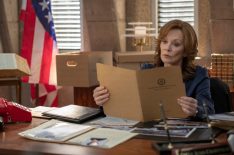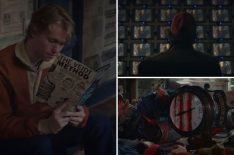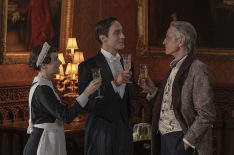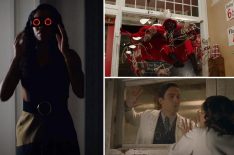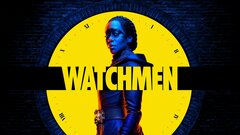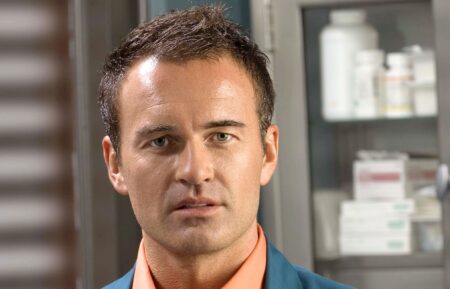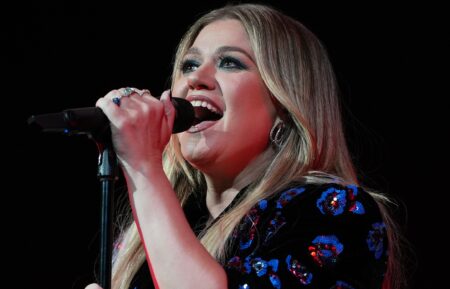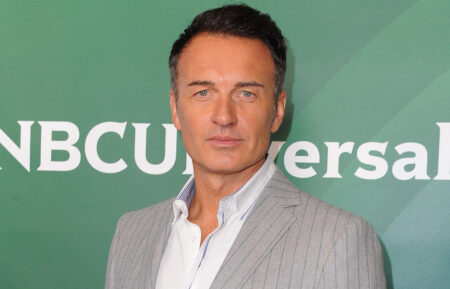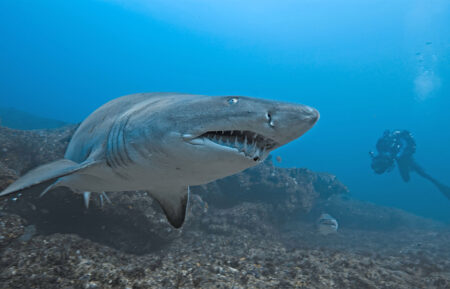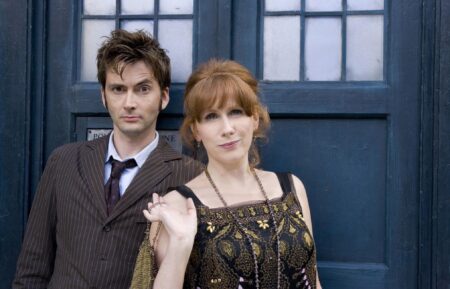Jovan Adepo on ‘Watchmen’s Biggest Episode Yet, Will’s Origin Story & Minutemen Connection
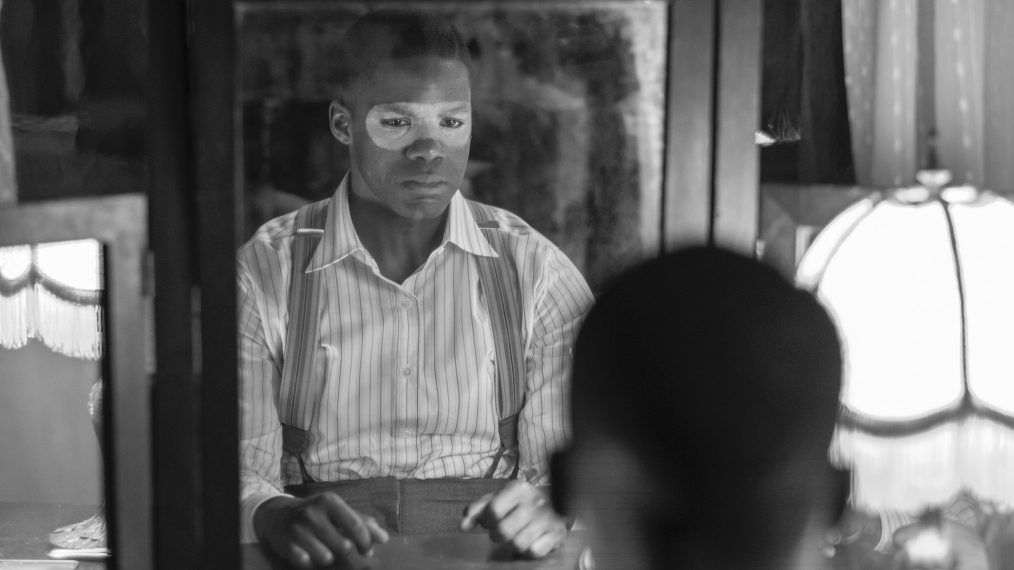
Spoiler Alert
[Warning: This article contains MAJOR spoilers for Season 1, Episode 6 of Watchmen, “This Extraordinary Being.”]
For viewers of HBO’s Watchmen, the drama from Lost and The Leftovers‘ Damon Lindelof has raised a lot of questions without many answers until the most recent episode, “This Extraordinary Being.”
After Angela (Regina King) swallowed her grandfather, Will Reeves’ (Louis Gossett Jr.), Nostalgia she went for a walk down his memory lane. In Gossett’s stead, Jovan Adepo (The Leftovers, Sorry for Your Loss, Tom Clancy’s Jack Ryan) stood in as a young Will Reeves, delivery a riveting performance of a man conflicted by the tragedies of his past and the law enforcer he wishes to be.
His memories clear some things up while also serving as an origin story for Hooded Justice, the first “costumed adventurer” in the Watchmen universe’s history. Below, Adepo opens up about the show’s most pivotal episode, the importance of this story, reuniting with Regina King and more.
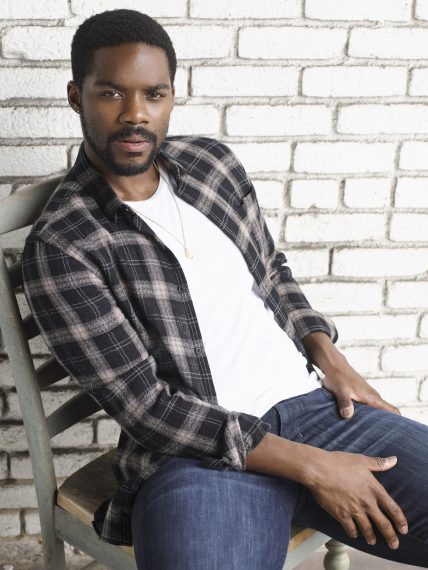
(Credit: Rowan Daly)
Hooded Justice’s history was vague in the original graphic novel – why is now the perfect time to fill in those blanks left behind?
Jovan Adepo: I think it was just a great opportunity that the writers took, because they could intertwine it with the narrative that they’re showing from this perspective of Watchmen now with the police covering their faces to protect their families and their own lives. I think it was a nice device to show another side of wearing a mask. And they were able to do so by using the little that we knew about Hooded Justice and intertwined it with the early Tulsa Massacre.
Being able to create a really interesting origin story and also at the same time being able to gift the fans of Watchmen who were anticipating getting to see some of their beloved characters… I think a lot of Watchmen fans will be happy to see how Hooded Justice became Hooded Justice.
Considering the pivotal nature of this episode, was there any apprehension to approaching this role or was it seen as an exciting challenge?
There was really no hesitation on my part. I think that as an actor, these are the type of roles that you look for because more than anything it’s always about the narrative and it’s always about the character study that’s at stake. While Damon [Lindelof] was explaining to me what Will’s story was I’d never felt that this was like some superhero story. This is a story about childhood trauma and how it manifested itself over the years into Will’s adulthood and how his connection and love and respect for the law and for strong human morality pushed him into wanting to do the right things and having no choice, but to do it while hiding his face.
Understanding that story at a very base level, it’s much bigger than a super story, so with that there was no hesitation, but I would have to say the apprehension kind of manifested itself in me once I got to Atlanta [to film]. I think every actor, when they take a role [like this]… they start to get the nerves and maybe a little anxious. I just kind of obsess over it and I get really nervous but I think that that’s a true sign that you’re taking the right part because you want to be challenged.
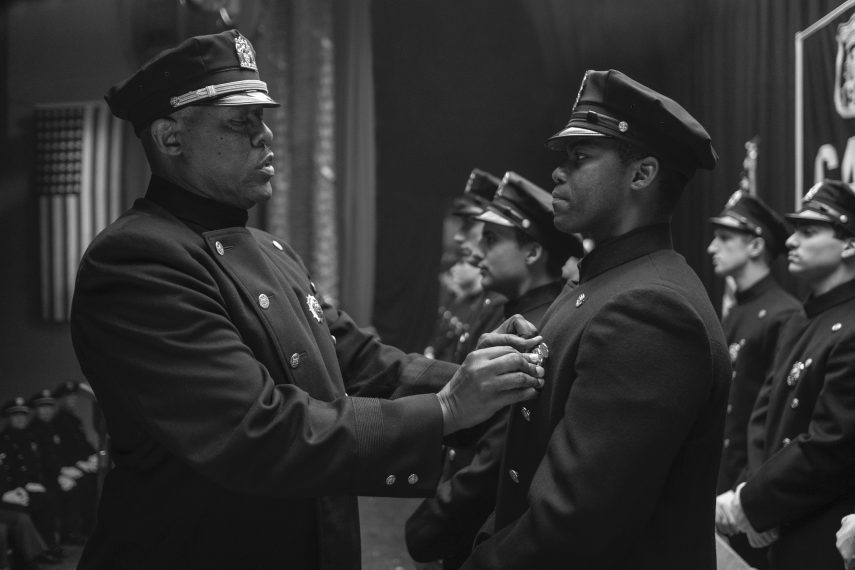
(Credit: Mark Hill/HBO)
And I think this experience has been showing me new things about myself and about the art form that I’m currently in and I’ve just been incredibly grateful for it. Whenever you get a chance to explore a character whose lifestyle and whose personality and whose history is different from yours, I think you should take advantage of it.
Despite being rooted in an alt-reality, Watchmen serves to educate viewers with historical events like the Tulsa Massacre. Was that important to you when signing onto the project?
I think it was a very exciting aspect of it. I think that the fact that the show as a whole [is based] in the Tulsa community and doing so in a way where it would be interesting for newer viewers to attach themselves to the story and learn something about our actual American history was very well executed. I think it’s a testament to the skill and the talent of the writer’s room and Damon who was absolutely leading the way. When you’re trying to bring historical moments to an audience, especially now, the attention span of viewers is ridiculously short, so you’ve got to hook them right away.
Audiences are smarter than ever, you know they’re not just going to accept bulls**t, they’re not going to accept any type of cheap trick. So you really have to be creative with your storytelling, I think Watchmen and the writers have been able to do that in every episode and I was just really excited to get to be a part of that.
Damon Lindelof has been open about the limitations of a white man telling a story about race. Why did you trust him to do Will’s story justice?
Because I knew that he would always have his ears open and his heart open to collaboration. I mean that goes back to The Leftovers, Damon has always done that. And I think that’s why you can very noticeably witness why actors love working with Damon, and that goes back to Regina King coming into this project with him and spending the whole season with him because he has a great understanding of his limitations as an imperfect human. He’s incredibly intelligent but nobody knows everything, so I think what he did very well was he opened the floor to the writers in the writers room where you have Cord Jefferson and Steven Williams… and plenty of others. I’ve always trusted Damon in his work. There’s always been a method to the madness and everything that Damon has put on television, whether it’s been with Lost, the films that he’s done or The Leftovers.
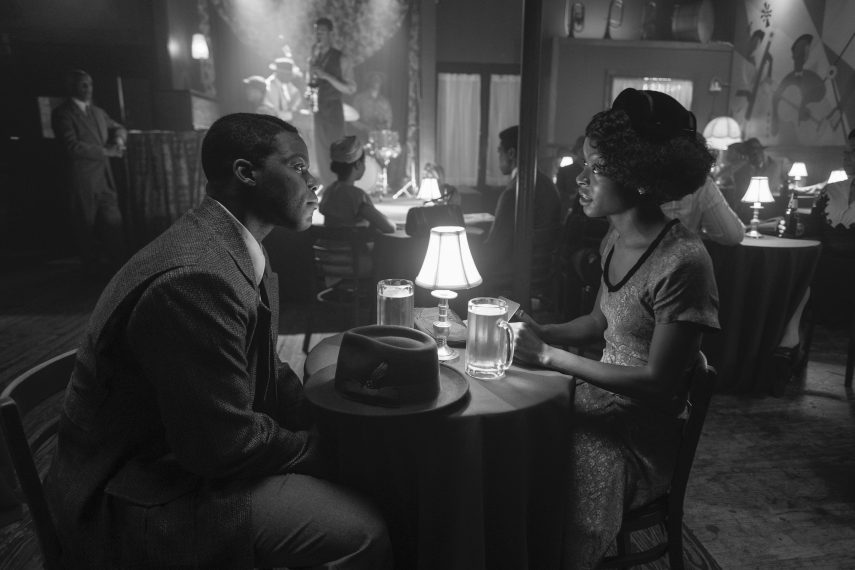
(Credit: Mark Hill/HBO)
Essentially, Will loses his family over the pent-up rage he taps into when wearing the hood. Would you say that killing Fred (Glenn Fleshler) – the man who burns the deli – breaks him in an irreparable way? Or does it set him free?
I’m not sure it sets him free. I think that Fred was the first major reminder of Will’s limits or limitations as a police officer. [Will] thought he was doing the right thing bringing [Fred] in and when he saw that even doing something exactly by the book, there was still powers that would be able to step in and determine a criminals fate. I think that he kind of lost faith in that, and so that’s what kind of pushed him into becoming Hooded Justice.
When you get to the big reveal of when he finds the deli and finds where Cyclops is actually running the operations, even his lover, Captain Metropolis (Jake McDorman) is unwilling to really help him expose this grand scheme of evil conspiracy. When he sees that, I think that’s what breaks him. And then it was really the last little string that was holding it together that ripped.
Seeing Fred again and [him] just being a huge antagonist, being disrespectful, being blatantly racist to them — I just think that that’s what pushes him over the edge. Even in that moment when he’s violently washing the paint off of his son’s face, and Danielle [Deadwyler], who expertly plays June, comes in and says “you can never take it off.”
You’re not just talking about the anger, she’s talking about the fact that he has so many masks on that he’s hiding under. Whether you’re talking about his sexuality, whether you’re talking about him trying to cover his skin color… it was just a combination of things that really weighed on him over the years and caused him to lose his family.
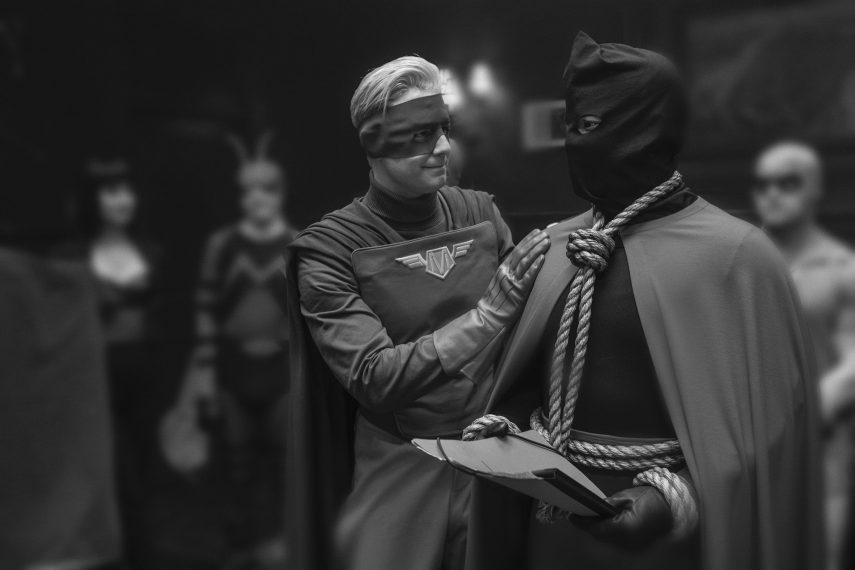
(Credit: Mark Hill/HBO)
It’s clear throughout the episode that Hooded Justice and Captain Metropolis’s relationship isn’t built on mutual respect and trust. Will we see more of that or did Will’s dismissal by Captain Metropolis hint at his upcoming exit from the Minutemen?
I would love to say that because I’m an alumni in the Damon Lindelof universe that I have all of the answers, but I do not. Captain Metropolis doesn’t have the same passion for preserving the law that Will does and seeing the difference in how he’s putting on a mask to do something about the crime in the city, whereas Captain Metropolis called it costume adventuring. He and the other Minutemen are using this fame and the exposure to promote banking and all these different ridiculous antics. I think that that was a clear moment for Will, to see that he was going to have to step away from the group because they weren’t sharing the same ambitions that he was and they weren’t after the same thing.
Generational trauma is a theme throughout this series. Is Will aware of how that is impacting Angela (Regina King)?
I think he has an idea and I think that that’s why he shows up when he does. When you think about the first episode, when she confronts him at the tree, there’s a stillness in him, kind of all of their interactions — speaking of Regina and Mr. Gossett’s performances as Angela and Will — there’s a stillness between him and a calmness in him. It just showcases Mr. Gossett’s brilliance — the confidence in him knowing that he is going to deeply affect her.
So as she’s trying to figure out who the hell he is and she’s aggressively interrogating him, he’s just like “this is who I am, I’m the guy that hung up the chief of police,” and he’s doing so in such a cheeky way that I think he just knows that once she finds out the information that he has, it’s going to change her life majorly. This is a big moment for her and for Will, I think he’s known that all along.
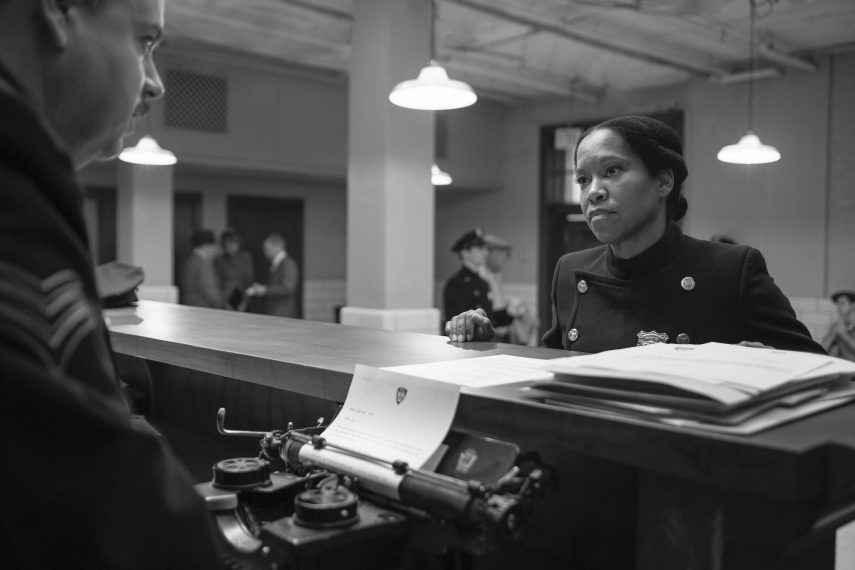
(Credit: Mark Hill/HBO)
The story of the Minutemen is sensationalized in the American Hero Story show within the series, as we see in this episode, things aren’t as they appear in reality. Do you think this reflects our own current society in any way?
I think it can. I think that legends and folklore can be incredibly dangerous and that the way people represent events and how they happen in comparison to how they actually occur in real life… When you see [American Hero Story] it’s very cartoony and all the colors that Hooded Justice is wearing are very bright and vibrant and the collar is high around his head and it’s closer to the source material.
But you could see how maybe that wasn’t the most practical costume to wear if you’re going to fight crime. So my shirt is black instead of purple and I didn’t have the big collar around my neck, it was just a very basic cape. The costume department decided to nix the collar and really streamlined all of the other things and they kept the core element and the core essence of the Hooded Justice costume. I think that was just them attempting to separate the folklore to the real reality in this universe.
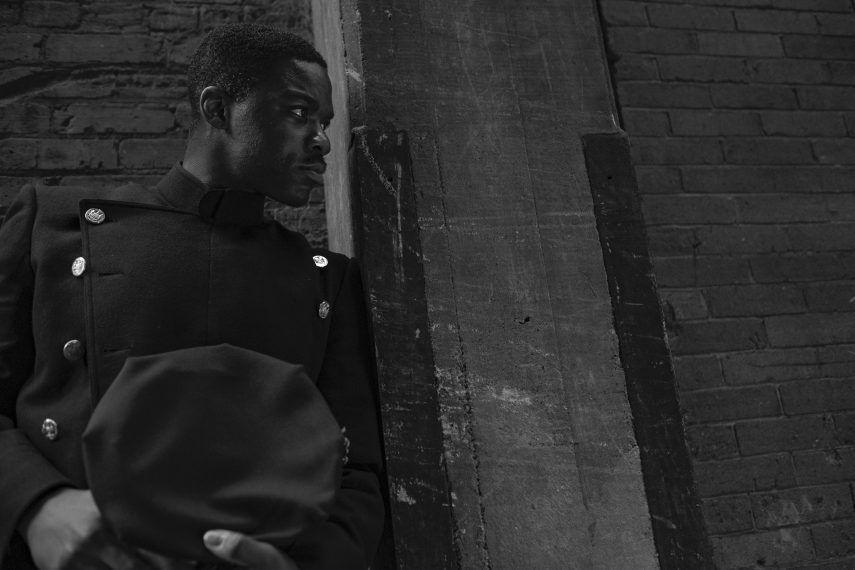
(Credit: Mark Hill/HBO)
You reunite with your Leftovers costar Regina King in this episode – what was it like to explore a role reversal of sorts with you being the “older” relative?
I was very, very fortunate to have built a relationship with Regina ever since The Leftovers. I mean the Murphy’s were kind of hanging out all the time, even after we finished the show. I still keep in touch with Regina, Jasmin [Savoy Brown] and Kevin [Carroll]. I was very fortunate to get a chance to work with her again.
There’s no [worry] of getting to know somebody and getting to know your limits as far as artistically. So we were able to really just jump straight into talking about it and talking about the similarities in our body and our body movements playing Will and really what we wanted to do sharing this performance. It was really cool to get to do that with her and we had a blast. It’s an experience that I’ll never forget.
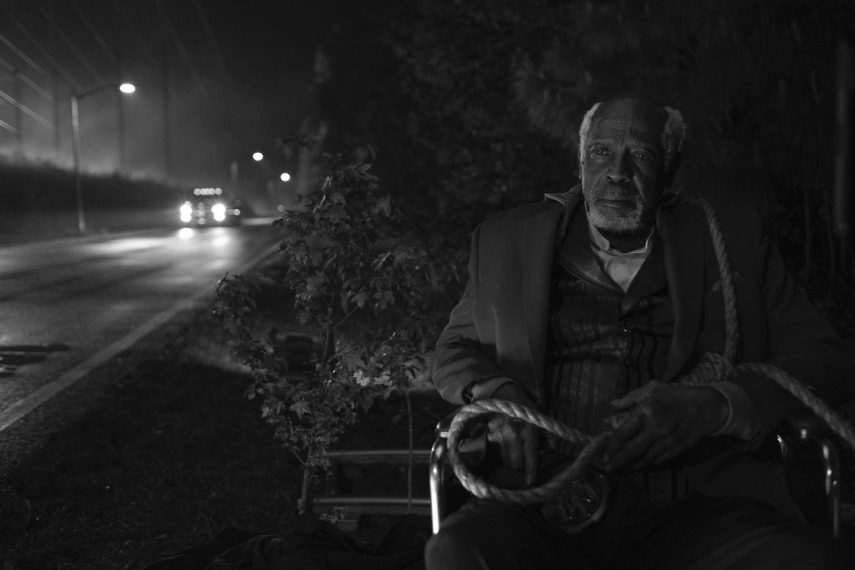
(Credit: Mark Hill/HBO)
Can you tease whether we’ll see your version of Will return?
Oh, you think I’m allowed to say? I think you could always be hopeful, but I think the safest thing that I can say is, I don’t know. That’s safest thing I can say without getting some phone calls.
Watchmen, Sundays, 9/8c, HBO

